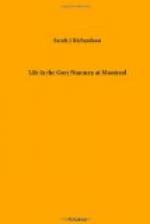CHAPTER I.
Parentage.—Father’s marriage.
I was born at St. John’s, New Brunswick, in the year 1835. My father was from the city of Dublin, Ireland, where he spent his youth, and received an education in accordance with the strictest rules of Roman Catholic faith and practice. Early manhood, however, found him dissatisfied with his native country, longing for other scenes and distant climes. He therefore left Ireland, and came to Quebec.
Here he soon became acquainted with Capt. Willard, a wealthy English gentleman, who, finding him a stranger in a strange land, kindly opened his door, and gave him employment and a home. Little did he think that in so doing he was warming in his bosom a viper whose poisonous fangs would, ere long, fasten on his very heart-strings, and bring down his grey hairs with sorrow to the grave. His only child was a lovely daughter of fourteen. From what I have heard of her, I think she must have been very beautiful in person, quiet, gentle and unassuming in her deportment, and her disposition amiable and affectionate. She was exceedingly romantic, and her mental powers were almost, if not entirely uncultivated; still, she possessed sufficient strength of character to enable her to form a deep, ardent, and permanent attachment.
The young stranger gazed upon her with admiring eyes, and soon began to whisper in her ear the flattering tale of love. This, of course, her parents could not approve. What! give their darling to a stranger? Never, no, never. What could they do without her? Grieved that their kindness should have been thus returned, they bade him go his way, and leave their child in peace. He did go, but like a thief he returned. In the darkness of midnight he stole to her chamber, and bore away from the home of her childhood, “a father’s joy, a mother’s pride.”
Who can tell the anguish of their souls when they entered that deserted chamber? How desolate their lonely hearthstone! How dark the home where her presence had scattered rainbow hues! A terrible blow it was to Capt. Willard; a very bitter thing thus to have his cherished plans frustrated, his brightest hopes destroyed; to see the very sun of his existence go down at midday in clouds and darkness. Yes, to the stern father this sad event brought bitter, bitter grief. But to the mother—that tender, affectionate mother, it was death. Yea, more than death, for reason, at the first shock, reeled and tottered on its throne; then, as days and weeks passed by, and still the loved one did not return, when every effort to find her had been made in vain, then, the dread certainty settled down upon her soul that her child was lost to her forever. Hope, gave place to despair, and she became, from that time, a raving maniac. At length death came to her relief, and her husband was left alone.




